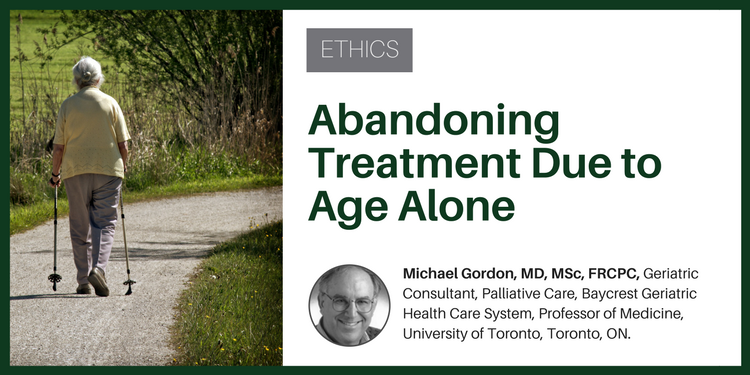
When caring for older adults with comorbidities, especially those at the extreme upper limits of life, it may be easy for providers to lessen the intensity of their curiosity and medical investigation. For some older individuals’ chronic conditions, the odds of a positive outcome may seem too distant or the patient’s discomfort—or, in many jurisdictions, the financial burden—may act as a barrier to the pursuit of answers.
Sometimes it can seem like the answer itself is unlikely to result in any meaningful benefit to the patient. When providers see an older patient with what appears to be a chronic condition, who is physically and mentally declining, it is not unusual for the provider to just accept it as a natural consequence of extreme aging. Patients themselves and their families are willing to accept futility as well, even if reluctantly, when the “verdict” comes from a physician—especially if it is a “specialist.”
One such example of this kind of case—what might be called “beneficent ageism”—occurred in my ambulatory geriatric practice. The patient was 95 years old when I first encountered her in my office accompanied by two devoted daughters who were committed to her care and fixated on the task of trying to allow her to live out most of her life in the communal home (one daughter lived with her with her family and the other lived close by). They were truly doting children.
The patient’s main complaint was cognitive impairment, and she fit the usual criteria for mild dementia with a range of vascular risk factors—she actually was started on and responded modestly to donepezil. With this positive result, it became clear that she had other bothersome symptoms that had, over time, been attributed to her age. For example, she became easily short of breath and had been to emergency rooms (ERs) over the years with what had been construed as heart failure due to a mixture of hypertension with (what seemed to be) mild chronic lung disease of uncertain etiology. She was maintained on the usual collection of vascular enhancers and pulmonary puffers, which afforded her some comfort with the acute episodes that had resulted in ER visits—an extra dose of furosemide and some intensive bronchodilator therapy.
She also had modest anemia, which had never really been looked into and seemed merely incidental. It was treated intermittently with blood transfusion for which no clear etiology was found—she had normal blood levels of B12, folate, and iron but a moderately low ferritin for which iron had been given with minimal benefit to her hematological parameters.
At the age of 97, I consulted with her attending physician and specialists to see what the cause of her anemia was and whether it could be possible that the degree of anemia might be compromising not only to her cognitive function but to her cardio-respiratory function. The daughters agreed that after blood transfusion she always seemed better in terms of her cognition and “breathing,” whereas, when the levels began to fall, she would often be short of breath at rest with little in the way of exercise reserve. Despite a number of enquiries, I could not convince any of the other physician specialists to agree to have her referred to a hematologist. Having heard about the possibility of a bone marrow biopsy with a hematologist, the daughters were even reluctant to intervene with an investigation that might cause her discomfort. I explained the procedure (having had a few myself for personal medical problems) and said, if by chance something were found, it might respond to medication that could stimulate the blood-making process of the body. The hematologist referral was eventually accepted with reluctance by the patient and her daughters.
One day a fax came through with a letter from a nephrologist and the hematologist indicating that they would forego an actual bone marrow evaluation to avoid discomfort but felt that the patient’s minor renal impairment combined with her other chronic disease burden might respond to therapy with erythropoietin.
About 8 weeks later, the patient and her daughters came into my clinic, early for the appointment as usual. When I saw them in the waiting area, they waved at me, and I could not help but note that the patient was not huffing and puffing as I had previously seen her—even while sitting. When their turn came and I could see her close-up, I saw that her skin color was more robust than usual, that she indeed was not huffing as she spoke to me, her cognition was at least as good as previously, and, if anything, the content of her speech and language appeared better. The more communicative daughter handed me a sheet of paper on which numbers were written. “You would not have received these yet as they are only from yesterday, so I copied them down for you—unbelievable.”
Indeed the numbers were impressive with a hemoglobin level that had gone up almost 20 points from the previous 6-month average. Her skin color and conjunctival color was close to normal. But most impressive was her breathing pattern and the animation of her speech. The daughters were beside themselves with glee and the patient thanked me—by name—which she was not always able to do.
There is an adage that goes something like “age alone cannot be used to determine the likelihood of usefulness of treatments.” While it should be understood that age is an important component of decision-making, if the investigation and treatments are not onerous by nature, they should not be discarded simply because of the high-age factor. Indeed, nothing should interfere with a thorough analytical review of possible diagnostic and treatment options for each individual a medical provider encounters.
This article was originally published online at https://www.managedhealthcareconnect.com/blog/abandoning-treatment-due-age-alone

